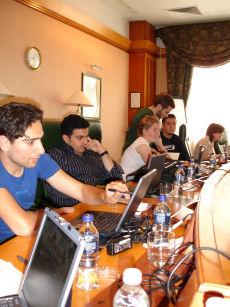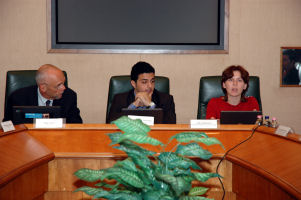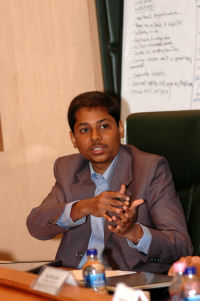BUDAPEST, Hungary, June 29, 2005 — What if people approached computer education like teaching a first language, exposing very young children to information technology not as a school subject but simply as part of life? Consider how natural it would be for these children to make use of technology, and adapt to new technologies, throughout their lives.

Board of the Future working session. Foreground: Itai Roffman (L) of Israel and Abdul Tarbzouni of Saudi Arabia. Budapest, June 2005.
This was one of many topics that emerged last week from a unique gathering of young futurists. For the second year in a row, Microsoft assembled its Office Information Worker Board of the Future, a panel of distinguished university students from around the globe, to discuss how information technology in the workplace most urgently needs to evolve in the next decade.
Twelve students from Brazil, China, Hungary, India, Israel, Russia, Saudi Arabia, Spain, Sweden and the United States, representing a diversity of academic disciplines, gathered in Budapest for three days to debate technology trends, interpret research data and share their perspectives on the imperatives for information technology in the next decade.
“I’m very excited about this program,” says Wolfgang Ebermann, general manager of Microsoft’s Information Worker business group in Europe, the Middle East and Africa. “These students have great aspirations — they want to contribute personally to the success of society. For their generation, technology is part of life, and they expect technology to take the next step with them.”
With an estimated 1 billion people around the world getting ready to enter the workforce, Ebermann says, Microsoft product designers are keenly interested in the opinions and perspectives of the “NetGen,” the first generation of people who have grown up with the Internet. These are the people who will drive demand and shape the future of information technology.
During the conference, the board members interpreted data from a perceptual survey of 150 of their peers, and from that information developed scenarios of information work in the future. Several members of the board also participated in a press conference to discuss the findings with local Hungarian and European journalists. The final outcome of the conference was to predict the top five changes in the workplace of the future.
According to Dan Rasmus, director of Information Work Vision at Microsoft and the leader of the Board of the Future project, the board is very different from a focus group where facilitators seek answers to specific questions. In this case, the students were asked to lead the dialogue and draw their own conclusions.
“We reach out to young people all the time across all of Microsoft’s business units,” Rasmus says. “What’s new with the Board of the Future is that this is their program, not ours. We are facilitating and making sure they stay on task, but they’re making the decisions and driving the conclusions. The only rules are that they back everything up with data we collected from the survey.”
Analyst Tom Austin, group vice president at Gartner Group and a Gartner fellow, facilitated the board’s predictive work on workplace technologies, and HP’s Luc Vogeleer, global services program manager for eLearning Portal Solutions, led a session in which he shared HP’s experiences working with educators in Northern Ireland and Sardinia. HP supplied some of the hardware for the conference, including Photosmart R717 digital cameras for each of the students and three of the HP Compaq Tablet PCs.
The Future of the Workplace
With Gartner’s Tom Austin facilitating the discussion, the students distilled their individual predictions into a set of five areas where they expect to see the most important workplace changes in 10 years’ time. In some cases, the fruition of these predictions seems inevitable — that pervasive connectivity will make anytime, anyplace work a reality; that user interfaces will become increasingly adaptive and natural; that new tools will help enterprises foster a “collective intelligence” through improved information discovery and use.

Gartner analyst Tom Austin (L) and Board of the Future members Abdul Tarbzouni (center) of Saudi Arabia and Sofya Mezhorina of Russia at a press conference. Budapest, June 2005.
The board also predicted that home technology will become connected and integrated, with consumer content and technology crossing over into the workplace. In other words, pervasive connectivity and less expensive devices will blur the lines between technology for personal and professional use, and, interestingly, the motivation to keep work life and personal life separate will fade. On the other hand, the students showed particular concern about maintaining a realistic work-life balance.
“Although the students are very agile and see technology as a key component of their own success, they clearly envision technology as a tool to help them manage their business time, so they can secure a high-quality personal life,” Ebermann says. “Microsoft must work against this charter — it’s essential that we take this point of view into account.”
The remaining prediction is that, with NetGen workers expected to change jobs nearly 20 times in their lifetime, lifelong learning will be essential for career development. The board predicts that the impetus for learning new skills coming from the individual, and this demand will drive more focused learning opportunities that are available on demand.
The Haves and Have Nots of Information Technology
While the board focused its attention on the leading edge of technology, awareness of the global “digital divide” was always in the background. Some of the countries represented on this year’s Board of the Future — Brazil, China, India — are powerhouse economies, yet have vast rural regions where computers are a rare commodity and Internet access is nonexistent. Hungary, a former communist bloc state that joined the European Union last year, is also poor by Western standards.
“I do think the development of the society is a big factor, and in Hungary we have to give society more time,” says Máté Szalay, a researcher and IT student the Technical University of Budapest. “For example, when you grow up in a poor region you learn that you cannot take risks in your company — you have to feed your family and you can’t be sure customers will always come.” This caution, he says, affects business owners’ willingness to invest in IT.
“In my country, people are completely different and the financial means are different,” says Russian board member Sofya Mezhorina. “Many companies don’t want to move from a hierarchical structure to a more networked, collaborative structure. So empowering employees with information worker technology may be extremely difficult.”

Varun Sunderraman of India is a Board of the Future member.
Rasmus, too, acknowledges that this group of students is not representative of all of the NetGen. “They are in a sense the cream of the crop,” he says. “However they are going to be the primary drivers of technology adoption in the workplace, so in that respect they are very strong reflectors of the kinds of work we will see in the future. Through the student survey, we will be reaching out in a much broader way to people who are not as fortunate as these students are, or who are not as technology-savvy, and capture those perceptions as well.”
An Enlightening Experience
The students, pleased with the material perks as well as the intellectual exercise of participating on the Board of the Future, seemed most inspired by the opportunity to interact with peers from so many parts of the world.
“It makes me feel so comfortable, being in a room of at least 12 other people who are just as inspired, as empowered, by technology as I am,” says Mezhorina, who will graduate this summer from Tambov State University in Russia, where she is studying linguistics and teaching methodology. “Their inner light, their vision of the future, and their desire to create change gives me a great sense of opportunity. Of course this is not real life — Microsoft chose people with these qualities, so once you go back, you have to maintain the belief inside yourself that there are young people everywhere who crave to create change around them.”
“I have been personally interested in futuristic thinking since my first project sponsored by Intel, when we were trying to estimate what the influence of multimedia would be,” said Indian board member Varun Sunderraman, who is finishing his master’s degree in electrical engineering and information sciences at Trinity College, Cambridge University, in the United Kingdom. “So I appreciate the insights of people, their viewpoints and methods of thinking. And I’m getting to use tools such as scenario planning with people who have diverse cultural and educational backgrounds.”
The students also left with the feeling that Microsoft, as a company, is highly motivated to develop software and solutions that reflect the way their generation thinks and acts.
“I think in little ways this process will affect the products Microsoft creates, because we are the future workforce and we are the consumer,” says Cherie Camille Wilson, a board member from the U.S. who recently graduated magna cum laude from the University of Pennsylvania with a degree in political science. “I think they will take our ideas to heart, and I hope to see some of our ideas actually take shape in the long run.”




